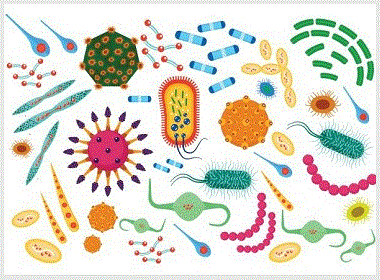

There are 1.3 microbes for each cell in our bodies
It is a well-known fact that our bodies house a wide range of miniature life forms, which make us who we are and allow human organisms to process food and extract nutrients.
But most likely, you had no idea that there are 1.3 microbes in our bodies per each living cell. Yes, our bodies have been taken over by ‘aliens’ long ago, and we didn’t even know it!
It’s been pointed out recently that our guts’ microbial composition is responsible for how happy we are, as neurotransmitters (proteins) are made through processing of our food by bacteria in the gut. Depending on the type of the bacteria, different proteins are produced, which, scientist say, impacts the way we feel.
But what’s more startling, the recent study suggests that an absolute majority of these microorganisms that sit inside us is completely unknown.
Scientists looked more closely at the strands of DNA in human blood and tried to match them with those previously identified by science. They discovered that more than 99% of the DNA does not belong to any forms of life known to us.
The researchers saw an extraordinary variety of forms: Those that relate to things that are already known to people, those that deviate, and a lot of things which are completely new and unexplored.
This research, the scientists say, not only provides us a glimpse of how diverse bacteria are in our bodies, but may eventually lead to the discovery of new types of viruses, and therefore new ways and means of protecting humankind from epidemics.

Scientists were shocked to discover that our bodies have been taken over by alien organisms, with 1.3 microbe per each living cell.
Science has no clue about 99% of microbes in our bodies
Initially, the study was supposed to analyze the best ways of predicting the success of transplants. The scientists set out to examine 188 blood samples in order to find out if a mixture of donor and patient DNA could indicate that the transplant was successful or not.
Turns out it could, but there was another striking finding to this study: 99% of all non-human DNA collected in the research did not match anything from the existing genetic databases. It was an unexpected and startling discovery for the whole scientific community.
Most of these non-human DNA belonged to the Proteobacteria phylum, which includes, for example, coliform bacteria (E.coli) and Salmonella. Previously unidentified viruses from the TT virus family were also discovered during the research.
The TT viruses usually infect humans or animals, but those that were found by the scientists do not fall into any of the groups. It is a completely new class of viruses, say the researchers, that affect people. But judging from the structure, they probably belong to the animal type and not those human viruses that we know today.
Considering the fact that microbes in human bodies are crucial for managing emotions, for the work of our immune system, and even to the operation of our brain, it is most essential that we start finding out more about those 99% unknown “aliens” and come to understand the little creatures living inside us.
Share this article













CommentsКомментарии ( 0 )